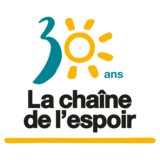La Chaîne de l'Espoir in Guinea
Transfers of children to France, equipment, training...
Latest news
A mission took place in Guinea from May 20th to 23rd, 2016. A TF1 journalist crew took part in the mission to film Hassane and Boubacar, who used to be conjoined twins, a year after they underwent surgery in France.
The TF1 crew also filmed the first ECHOES programme session, a remote cardiac ultrasound exam broadcast in real-time between Ignace Deen Teaching Hospital and Paris.
Context
The Republic of Guinea is one of the world’s poorest countries. It is ranked 180th out of 186th based on the 2014 Human Development Index of the United Nations Development Programme (UNDP).
Because of the country’s low economic growth, the Guinean healthcare system is not effective : it is neither accessible, equitable or able to realise the right to health to which everyone is entitled.
Treatment
For several years, La Chaîne de l’Espoir has been taking actions to help Guinean children by organising and funding transfers of ill children to France so that they can be operated on in the best possible conditions.
In 2015, 7 children were brought to France :
- So were the conjoined babies Hassane and Boubacar, who underwent a delicate surgery to be separated at Necker-APHP Hospital in France in May 2015. Thanks to Professor Aigrin and all the links of La Chaîne de l’Espoir, the first conjoined siblings to be born alive in Guinea now have the chance of a better life.
- 2 year-old Mohamed’s intestinal functions were restored thanks to an oesophagus operation he underwent in November 2015.
- Sia Angèle was operated on for a caustic stenosis at Necker Hospital by Professor Chardot in December 2015.
- Aminata, a young Guinean girl of 13 suffering from breast hypertrophy, also underwent surgery in France in February 2016.
- Yaya was operated on at Monsouris Hospital in March 2016 by Professor Gayet for a life-threatening caustic stenosis.
- 10 year-old Fadaman was also saved from caustic stenosis at Necker Hospital in March 2016.
- Aissata, 20, received heart surgery in February 2013.
Supporting Donka teaching hospital
La Chaîne de l’Espoir’s action does not stop here. Our organisation also supports Donka Teaching Hospital in Conakry by providing medical supplies for both patients and local professionals (electric scalpel handles, probes, transfusion sets, syringes, etc.) and basic disposable goods (paracetamol, urine test strips, etc.).
Training
La Chaîne de l’Espoir supports Guinean paediatric surgeons on the Postgraduate Degree in Paediatric Surgery (PGD PS) through theory and practice training missions.
2016 big steps
- In 2016 La Chaîne de l’Espoir intends to continue to work together with Donka Teaching Hospital in order to equip the temporary surgery unit, set up in a military camp, with a surgical lighting system.
- A project to build a hospital for mothers and children in Conakry, supported by the First Lady of Guinea, is under consideration. Further visits in Guinea will take place.
- La Chaîne de l’Espoir will further develop its training programme for postgraduate students in Conakry by organising new seminars and granting scholarships to two Guinean students enabling them to continue their studies in Ivory Coast.
- 2016 will also mark the launch of our ECHOES programme, a real-time distance training programme in paediatric echocardiography initiated by La Chaîne du Savoir. Its aim is to create an online platform allowing any health centre with an ultrasound machine and a referral doctor to benefit from the tele-expertise of paediatric cardiology experts at no cost. This programme has already been successful in several countries such as Cambodia and Mozambique, where respectively 200 and 72 children have benefitted from these consultations.
